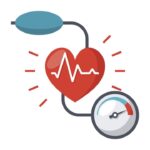Liver fibrosis is a serious condition with potentially dangerous complications. Early detection and timely treatment with appropriate protocols can lead to recovery. Therefore, recognizing the clinical symptoms of liver fibrosis at each stage is crucial for effective management.
1. Understanding Liver Fibrosis
Liver fibrosis is the advanced stage of the scarring process in the liver, resulting from various causative factors. Common triggers include chronic viral hepatitis and alcohol abuse. The liver attempts self-repair after each injury, leading to the formation of scar tissue. Prolonged damage results in increased scarring.
The fibrotic process impedes the liver’s basic functions, hindering blood flow and slowing the processing of nutrients, hormones, medications, and toxins. It also contributes to a reduction in the production of essential proteins and other substances by the liver. In the advanced stage of fibrosis leading to cirrhosis, life-threatening complications can arise.
2. Clinical Symptoms of Liver Fibrosis Across Stages
2.1. Stage 1
In this early stage, there are no specific signs of liver damage. However, inflammation begins, and prolonged inflammation triggers the liver’s attempt to reverse the damage, leading to fibrosis. Patients may experience fatigue, weakness, and malaise. Detection in this phase is challenging, but early intervention increases the chances of complete recovery.
2.2. Stage 2
At this stage, portal vein pressure increases, and fibrotic tissues become more prominent. The treatment goal is to eliminate the root cause. The likelihood of functional recovery is still high during this stage.
2.3. Clinical Symptoms of Stage 3 Liver Fibrosis
In stage 3, patients may develop abdominal swelling, indicating severe liver fibrosis. Recovery chances diminish, and treatment options are limited. Symptoms include:
– Loss of appetite
– Rapid weight loss
– Jaundice, pale or yellowish skin, and yellow eyes
– Fatigue, weakness
– Blood sugar dysregulation
– Persistent itching, skin inflammation
– Swelling of the ankles

Jaundice, pale or yellowish skin, and yellow eyes are warning sign of many serious health problems, including cirrhosis
2.4. Clinical Symptoms of Stage 4 Liver Fibrosis
This is the final stage where complete fibrosis has occurred. Dangerous complications such as gastrointestinal bleeding, increased portal vein pressure, and hepatic encephalopathy may appear. Treatment options are limited, and life expectancy is shortened. Symptoms are similar to stage 3, with additional signs such as extreme fatigue, drowsiness, personality changes, peritonitis, high fever, red palms, and abdominal distension.

Persistent itching and skin inflammation are warning signs of weakened liver function
3. Early Detection of Liver Fibrosis
3.1. Recognizing Symptoms
In the initial stages, patients often exhibit subtle or no symptoms. Over time, signs of severe liver damage may include:
– Fatigue, dizziness
– Loss of appetite, rapid weight loss
– Jaundice, persistent itching
– White fingernails
– Easy bruising, abdominal swelling, ankle swelling
– Menstrual irregularities in women, loss of libido in men
Immediate consultation with a Hepatology specialist is crucial when these symptoms appear for prompt examination, diagnosis, and appropriate intervention. Early treatment enhances the chances of restoring liver function and improving overall health while saving time and costs.
3.2. Identifying Causative Factors
Liver disease progressing to fibrosis takes a considerable amount of time. Common causative factors include:
– Chronic alcohol abuse
– Obesity or overweight
– Viral hepatitis infections
Regular check-ups with a physician are recommended for those at risk, facilitating early detection, treatment protocols, and effective prevention of liver diseases.
3. Liver Fibrosis Treatment
Based on the individual’s fibrosis status, physicians develop personalized treatment plans. Treatment methods include addressing causative factors, managing and preventing complications.
4.1. Treating Causative Factors
Early treatment can lead to complete recovery. Initial interventions focus on addressing factors contributing to the disease, minimizing further liver damage:
– Medications for controlling hepatitis B, C
– Abstinence from alcohol
– Weight management, especially for non-alcoholic fatty liver disease (NAFLD)
– Medications to alleviate fibrosis symptoms
4.2. Complication Management
For advanced fibrosis with complications, effective management is essential. Depending on the severity of complications, physicians may recommend appropriate internal or surgical treatments.
Diagnostic tests and examinations include:
– Blood tests
– Liver function tests
– Liver ultrasound
– Endoscopy
– CT scans
– MRI scans
Regular check-ups and adherence to the treatment plan prescribed by a specialist are crucial for patients with fibrosis and complications. Additionally, dietary and lifestyle modifications should be discussed with a healthcare provider for optimal treatment outcomes.

Examination and treatment of fibrosis at an early stage increases the likelihood of recovering liver function, and improves the patient’s quality of life.
4.3. Liver Transplantation
Liver transplantation involves replacing the damaged liver with a healthy one. This method is reserved for individuals with severe liver fibrosis and extensive damage.
In conclusion, liver fibrosis is a potentially life-threatening condition, especially when complications such as cirrhosis are present. However, with proper and timely treatment, the disease can be controlled, preventing further progression.
It is important to note that the information provided is for reference purposes and research and does not replace medical consultations, diagnoses, or treatments. Patients should follow the guidance of healthcare professionals to ensure their health and well-being.








